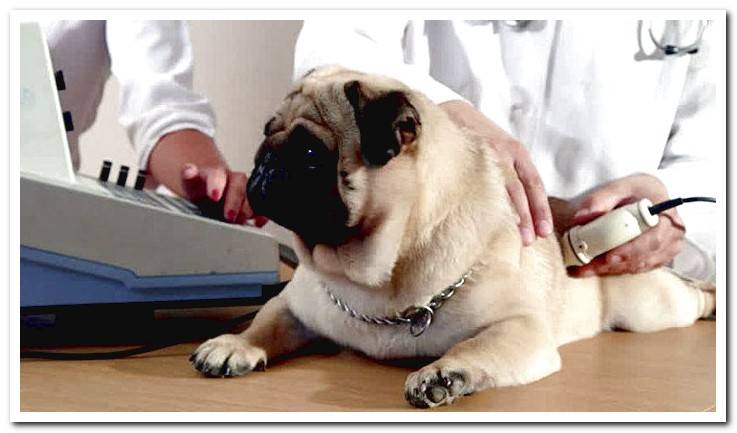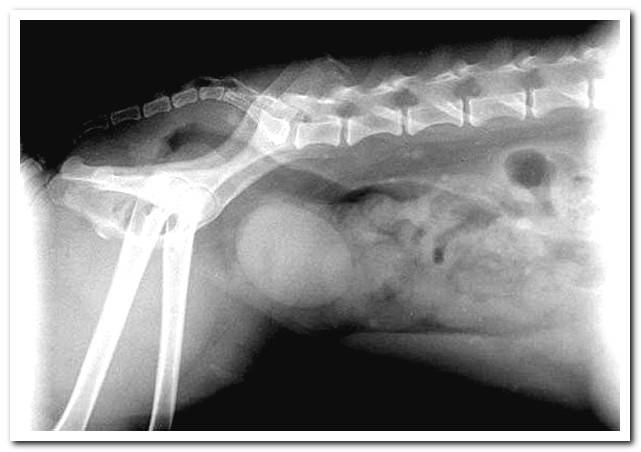
If we live with a male dog, we should know that it can also suffer from prostate problems, an accessory gland that bitches do not have. In this Dogsis article we will see what pathologies affect it and how we can treat them.
Index of contents
- 1 What is the prostate?
- 2 Prostate enlargement in dogs
- 3 Prostate Cancer in Dogs
- 4 Canine prostatitis
What is the prostate?
The prostate is a accessory gland which is completely surrounding the dog’s urethra, at the outlet of the bladder. Your upper area can be felt by rectal examination. Its function is to produce part of the seminal fluid, hence its relationship with the reproductive system and reproductive hormones.
Thus, the problems that the prostate will suffer will be related to urinary or hormonal disorders. These diseases are the benign hyperplasia, prostatitis and cancer prostate. The symptoms are related to the location of this gland.

Prostate enlargement in dogs
The veterinaryn, by means of a rectal examination, can detect if a prostate appears enlarged or not. In this review, the professional detects, in addition to the size, position and consistency of the gland. Ultrasound is a test that will also provide information.
An increase in the size of the prostate may be due to the disorder known as benign prostatic hyperplasia. This pathology is related to hormones, being influenced by the testosterone.
That is why it affects, above all, males that are whole, that is, that have not been castrated, and from approximately five years of age, being more frequent in older dogs.
The growth of the prostate causes it to extend backwards and, in this way, it can put pressure on the rectum. This causes the dog to suffer constipation or make efforts to defecate. In addition, the stool will take a characteristic flattened shape. This situation can lead to the appearance of impactions fecal.
A fecal impaction is a mass of stool that has become hard in the rectum or colon. The narrowing that an enlarged prostate produces in the rectum explains its formation.
It is less common for the prostate to push forward, which, instead of the rectum, would put pressure on the urethra. In that case the dog would have trouble peeing. In addition, this urine may contain blood, which is known as hematuria.
Since benign hyperplasia is related to testosterone, castration manages to eliminate the problem. It is the treatment of choice in most cases. After operating, in a short time, the size of the prostate decreases and the symptoms disappear. Drugs may also be prescribed, but their possible side effects must be considered.

Prostate Cancer in Dogs
It’s another cause of an enlarged prostate, although, luckily, very rare in dogs. Contrary to what happened with the hyperplasia that was related to the hormone testosterone, this cancer does not have the same hormonal link. This means that castration does not influence the appearance or progress of the Cancer in these cases.
The treatment of choice is surgery. It should be borne in mind that many times the diagnosis is reached when the disease is already very advanced. This worsens the prognosis and complicates the intervention.

Canine prostatitis
Prostatitis is caused by a bacterial infection, many times after cystitis. The prostate on palpation appears large, swollen and soft. A prostatitis sharp will be responsible for symptoms such as the following:
- Fever, due to infection
- Decay, the dog will be listless
- Vomiting
- Diarrhea
- Painful discharge of urine
- In some cases we will see the dog with the back arched and the belly collected due to pain
- Secretions with pus or blood may come out
Prostatitis can also become a chronic disease. The dog will have recurring outbreaks. This type of prostatitis can make the animal sterile. The diagnosis, as in hyperplasia, is made by palpation and ultrasound. Samples of secretions from the prostate can also be taken, from which culture or cytology will be done.
Treatment will consist of establishing a suitable antibiotic. The downside to the prostate is that when it’s swollen, the antibiotic will have a hard time working. That is why the treatment will need to be long. After it, it is convenient to repeat the culture to resolve the infection or not.
Castration may also be recommended in these cases. First, because it prevents the appearance of benign hyperplasia, which will favor bacterial infections of the prostate. Prostatic atrophy that occurs after castration is also beneficial, which will serve to prevent prostatitis.
Sometimes prostatitis gets complicated. One of these complications is the appearance of an abscess, that is, an accumulation of pus, in this case in the prostate. If this occurs, it will be necessary to resort to surgery.
